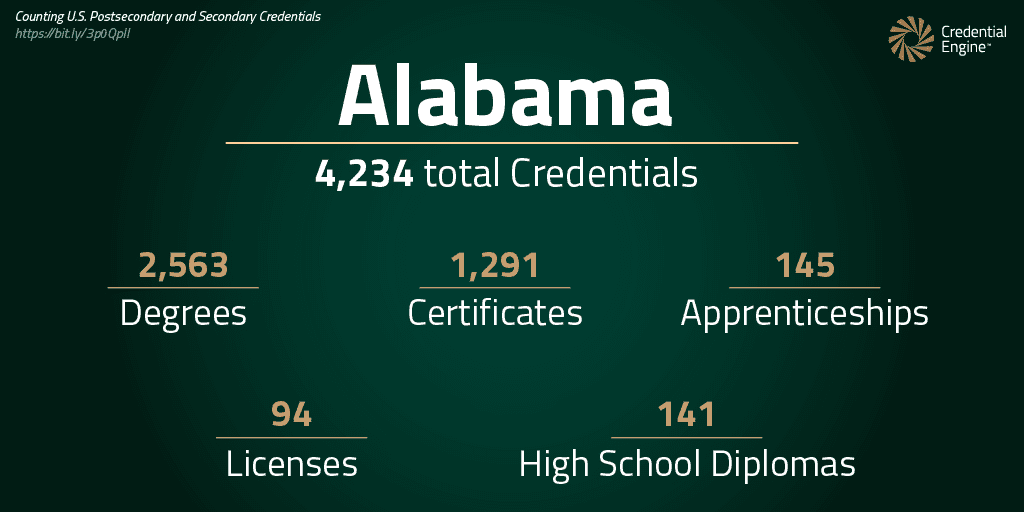A Common Language and Registry of Credentials are Critical to a Successful Statewide Workforce Strategy
Leaders in Alabama are developing a statewide credential registry and will use the common languages developed by Credential Engine (CTDL and CTDL-ASN) as the foundation for important skill development work to advance the success of all Alabamians. Strengthening this labor market information state infrastructure streamlines data collection and ensures that accurate, up-to-date, and uniform education and workforce data supports multiple stakeholders and purposes.
State leaders have set ambitious goals for this work, including the following:
- Add 500,000 credential holders to the workforce by 2025. Alabama, like many of Credential Engine’s state partners, has leveraged the partnership as a key way to work toward their state postsecondary education attainment goals and to leverage existing education and workforce initiatives.
- Develop a portal for external education and training providers to input data on credential programs and provide technical guidance as needed. The portal will give Alabamians additional access to the information they need to make better decisions.
- Better articulate high-demand skills and knowledge. Alabama will also identify which competencies and credentials of value, including quality non-degree credentials, are linked to each in-demand occupation.
- Launch the high-value credentials list known as the Alabama Compendium of Valuable Credentials. The list will consist of regional and state career pathways and identify which valuable credentials will be mapped to those pathways. In order for education and training providers to be considered for inclusion on this list, they will first need to agree to publish information about the credentials they offer to the Credential Registry. Adding this requirement ensures that all credential data will be made available in a common language by being mapped to the CTDL. This will allow leaders in Alabama to define credentials of value in ways that were not possible before due to data silos that existed between different systems and tools.
- Empower Alabamians with Digital Resumes: The state will design the Alabama College and Career Exploration Tool (ACCET) to serve as a digital resume and comprehensive learner record to display verified, industry-recognized credentials and competencies mastered through a comprehensive learner record. Credential information displayed through the ACCET will signal to employers that a worker or student possesses the requisite skills for either an entry-level job or a progressive wage increase as a result of mastering the next competency within a stackable sequence. The ACCET will also use the CTDL and CTDL-ASN as the common languages for each individual’s credential and competency records and will integrate other important tools such as career exploration and the Alabama Works! job portal.
The Value of a Common Language to Alabama’s Statewide Workforce Development Strategy
ACHE is using Credential Engine’s common languages for describing credentials (CTDL) and competency frameworks (CTDL-ASN) to set up the hardware and software infrastructure for collecting and organizing credential program data in Alabama. Leaders in Alabama recognized that building this foundational infrastructure using these common languages would streamline data sharing between state agencies by breaking down existing data silos; previously, each agency collected data but did not always make it transparent, and did not employ standard ways to describe credentials. ACHE is using the infrastructure to create a statewide credential registry that will also connect to the P20W longitudinal data system, known as the ATLAS on Career Pathways. The data from the statewide registry will also be published to the national Credential Registry (housed by Credential Engine) in order to facilitate connections across state lines. Alabama’s credential registry will support the work of the newly established Alabama Committee on Credentialing and Career Pathways (ACCCP) to define in-demand industries and occupations, develop statewide career pathways, and approve credentials of value to be included on the Alabama Compendium of Valuable Credentials.
Credential Transparency Efforts are Facilitating Immediate Response to COVID-19 and Building Information Infrastructure for the Future
According to project lead Nick Moore, Credential Engine’s infrastructure has enabled the state of Alabama to provide short-term solutions to meet the challenges of a rapidly changing economy—and make key contributions to long-term structural change and innovation: “The fact that we have partnered with Credential Engine to begin using the CTDL to register our credentials and then make stackable sequences has given us the opportunity to lay down occupational DNA for all of our in-demand occupations. That’s allowed us to make some quick adjustments in real time.” These quick adjustments have been essential as Alabama responds to and prepares to recover from the Coronavirus pandemic. Leaders are using credential data and credential transparency as primary elements of their response and strategy, with a focus on reskilling and upskilling in the critical healthcare and IT sectors. As they work to better meet the needs of all Alabama residents, they will continue to rely on Credential Engine’s technologies, project management, and network to ensure that learners, jobseekers, employers, policymakers, and more have access to the reliable and actionable information they need to make better informed decisions.
Collaborating Agency Roles
- Governor’s Office of Education and Workforce Transformation: Oversees the project and coordination among collaborating agencies.
- Alabama Commission on Higher Education (ACHE): Manages data collection, software development, mapping to CTDL, and publishing to the Credential Registry.
- Alabama Department of Labor (ADOL): Develops Alabama’s list of in-demand occupations and competency models for each in-demand occupation. Manages the development of the Alabama College and Career Exploration Tool (ACCET) and the statewide P20W longitudinal data system (ATLAS on Career Pathways).
- Alabama Department of Commerce: Houses the Alabama Office of Apprenticeship (AOA), which was recently approved as Alabama’s state apprenticeship agency and operationalizes competency and credential taxonomies.
- Alabama Committee on Credentialing and Career Pathways (ACCCP): The ACCCP is a public-private entity tasked with an annual, two-fold mission: (1) identifying Alabama’s regional and statewide in-demand occupations and (2) identifying credentials of value linked to those in-demand occupations.


